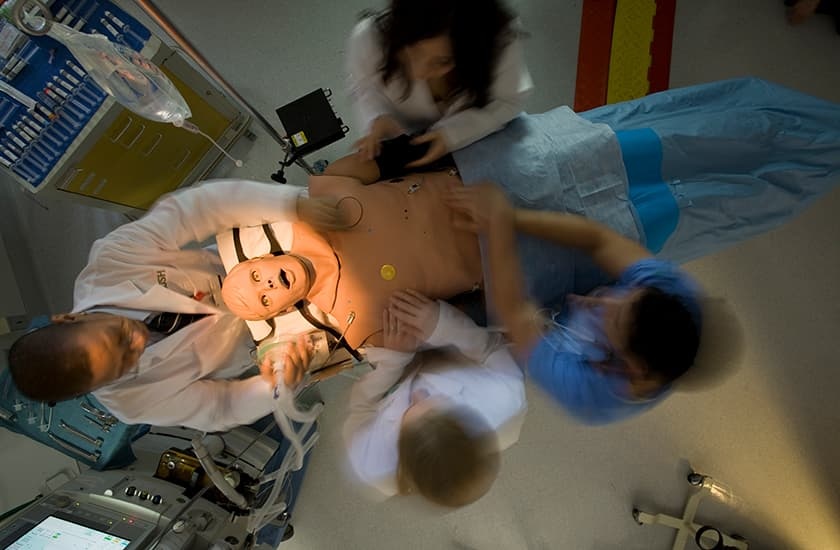The Rush Center for Clinical Skills and Simulation has received accreditation from the American College of Surgeons, a recognition that the 17-year-old facility, which underwent a major renovation in 2014, is at the forefront of this 21st century model for training medical personnel across the board.
Accreditation from the ACS, one of two authorizing organizations for simulation centers, is a recognition that Rush holds to the highest standards with its overall simulation program. It promotes patient safety by establishing best practices, evaluating protocols on an ongoing basis and updating them as needed.
"A lot of places have Sim Centers, but not all of them have the high-quality simulation-based medical education that we offer here," says Michelle Sergel MD, Executive Co-director of the center.
The center offers a wide variety of training that reaches across the Rush University System for Health and to health professionals throughout Chicagoland and beyond. For example, the center will host a Simulation and Procedural Bootcamp for Emergency Medical Clinicians on October 14-16. This CE credit-eligible program for emergency room physicians, nurse practitioners, physician assistants, advance practice clinicians and others allows professionals to master crucial procedures commonly performed in emergency departments in high-fidelity simulation. Rush University is a member of the Chicago Simulation Consortium and also hosts disaster simulations for the Advanced Trauma Training Program taught by Emergency Medicine faculty members to military medical personnel several times each year.
With seven real-world patient-care settings, Rush's Sim Center also offers sessions on laparoscopic surgery; emergency room "Code Blue" crash scenarios; cardiopulmonary resuscitation; and complications from anesthesia, to name a few. Interprofessional training is conducted to improve teamwork and leadership skills for caregiver teams that can include physicians, nurses and other healthcare personnel. Participants can review digital recordings of their sessions, which can also be used to teach other students.
All new residents and students take part in an "on-boarding" program before they start working in the hospital, to check and hone their skills, so they'll be ready for the most demanding parts of the job from day one.
“It's a safe place to make mistakes," says Michael Kremer PhD, CRNA, Executive Co-director of the center.
Rush has 2,700 students in its educational programs, including its colleges of medicine, nursing and health sciences. The medical center's 600 house staff also come to the Sim Center to learn, and to keep their skills current and strong. Rush's Sim Center has gone from 20,000 learner hours per year in 2003 to more than 60,000 learner hours this year.
“Having a single center helps," says Sergel. "They all train under the same roof."
The center deploys, as appropriate, live actors to allow students to practice diagnosing, interacting with patients and family members, communicating with other professionals, and even what to do if a patient's condition deteriorates rapidly. Mannikins emulate heart sounds, pulses, breath sounds, and other bodily functions and may be used for training in invasive procedures like ventilation and defibrillation. Skill trainers and cadaver parts are available to teach central-line placement, emergency surgical airway access and for arthroscopic surgery simulation.
Achieving ACS accreditation is a proud occasion for Rush's Sim Center. Sergel praised Rush leadership for supporting the center's efforts to excel over the years.
And Kremer says, "I'm so proud of our team. We are demonstrating that simulation makes a difference for our students, and ultimately, for our patients."

